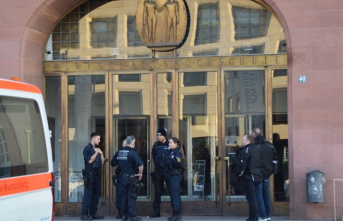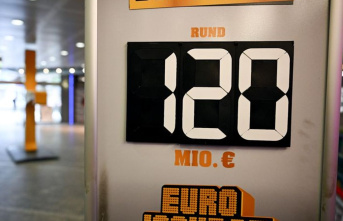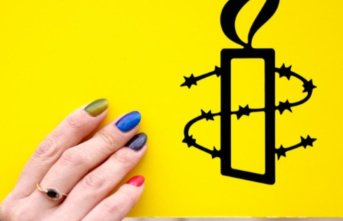The Strasbourg sentence for the Atristain case is now final and it remains to be seen what the consequences of the ruling may be. The European Court of Human Rights (ECHR) has dismissed the appeal filed by the central government against this sentence, which condemned Spain for violating the right to a fair trial of which Xabier Atristain was a member of ETA.
The AVT warned a month ago of the consequences in case the State Attorney did not appeal and the sentence was final, and even spoke of "a massive release of ETA prisoners." The Government appealed, although the Court of Strasbourg has dismissed this route. The decision, however, was not surprising, since the ECHR unanimously handed down the sentence in the Atristain case, without any dissenting votes.
The judges consider that by applying the period of solitary confinement, the "right to a fair and equitable trial" of the convicted person was violated, as well as his "right to defend himself." In this way, Spain violated article 6 of the European Convention on Human Rights regarding the rights to a fair trial and legal assistance chosen by the detainee. The jury concludes that the State must pay Atristain 12,000 euros for non-pecuniary damage and another 8,000 for costs.
Now, the unknown is what the consequences of the Strasbourg sentence may be and if, as the AVT pointed out, it will lead to "a massive release of ETA prisoners."
The substance of the sentence on the Atristain case has to do with the application of the incommunicado period for a detainee for the crime of terrorism and with the way in which this regime was applied. The alert of some groups of victims is that the pronouncement of the ECHR establishes jurisprudence, in such a way that it would affect prisoners convicted of terrorism in whose processes the period of five days of solitary confinement has played a key role.
Strasbourg, not in vain, points out that the statements made by Atristain, sentenced in 2013 to 17 years in prison for belonging to ETA, during his police detention were a "significant basis for the conviction" of the accused, so that he "was irreparably their right to defense.”
Sare, which defines itself as a citizen network in support of prisoners' rights, has pointed out that the ruling, once it is final, "should serve to review how many have occurred in similar circumstances against Basque prisoners."
In any case, the first question is whether the sentence would affect only the prisoners who appeal to Strasbourg or, as happened with the Parot Doctrine, all those affected -in this case by solitary confinement- and automatically.
This is a controversial issue from a legal point of view. The Secretary of State for Justice, Tontxu Rodríguez, explained yesterday to groups of victims of terrorism that the sentence would only affect Atristain. The legal sources consulted by this means agree on this point, that is, they consider that it would not have an automatic effect on judicial proceedings in which solitary confinement may have played an important role. However, they also emphasize that he could have it in cases in which he resorts to Strasbourg.
The ECHR, however, should analyze in each case the influence that the statements made during the incommunicado regime have had on the future of the judicial processes.
According to the legal sources consulted, the compelling reason that would prevent an automatic release of prisoners convicted of terrorism and affected by solitary confinement has to do with a change in the Law of Criminal Procedure approved in 2015.
As of that legal modification, only those prisoners who have an ECHR ruling in their favor that annuls their sentences can request a review of their case.
This legal change came after the repeal of the Parot Doctrine and would prevent, precisely, what happened in relation to that Strasbourg pronouncement.
That doctrine was born in 2006, when the Supreme Court resolved an appeal filed by the defense of ETA prisoner Henri Parot, also known as Unai Parot, and ruled that the reduction of sentences for prison benefits had to be applied to the total sentence. and not the legal maximum period of imprisonment imposed by a conviction.
In other words, if an inmate received prison benefits equivalent to six months in prison, based on this doctrine, they would be deducted from the total number of years to which he had been sentenced (in the case of Parot, 4,800 for 33 murders) instead of over the legal maximum of compliance (in the case of Parot, 40 years, as it deals with sentences for terrorism and as a result of Law 7/2003).
This doctrine was struck down in 2013 by the European Court of Human Rights in Strasbourg, which allowed the practically automatic release of several ETA prisoners.
The legal change of 2015 would require that the requests for review of the case be preceded by a specific judgment of the ECHR, so that a general interpretation based on the Atristain case would not be valid.
In addition, there is a difference of significance in relation to the case of the Parot Doctrine. So, the doctrine of the Supreme Court had affected a specific and known number of cases; they were identified and the question admitted little discussion. This does not happen in relation to the Atristain case, since it would be necessary to determine to what extent incommunicado detention would have played a key role in the different judicial proceedings, a point that is more controversial from a legal point of view.
Another important nuance in relation to this case is that a final sentence that indicates that the convicted person's “right to a fair and equitable trial” was violated does not entail a release, but rather the annulment of the sentence. From there, the Supreme Court must decide whether to review the case and repeat the trial. Of course, in a new trial, what the convicted person declared during the five days of solitary confinement could not be taken into account.
This point is transcendent for the defense of the prisoners, since they consider that in many cases the main evidence comes from testimonies made during the period of solitary confinement and, according to what they denounce, obtained in their day under torture.
The AVT, on the other hand, asked the Government to "begin to carry out the educational work necessary to demonstrate to the members of the Strasbourg Court that incommunicado detention does not necessarily imply a violation of rights."
In any case, annulment of the sentence is not the same as the definitive release of a prisoner, who may or may not be sentenced again in a new judicial process.
The AVT warned, before the appeal of the State Attorney, of a "mass release", although it did not specify how many judicial processes a final sentence from Strasbourg could eventually affect. The question is not clear, and neither do they dare to give a figure from the defenses of those convicted of terrorism. In any case, some sources indicate that there could be around a hundred, that is, more than half of the prisoners in prison convicted of terrorism and for belonging to ETA.
In any case, the legal sources consulted insist that the prisoners, each of them, would need a ruling from the ECHR stating that their right to defense was violated, the key that would allow the annulment of their sentence.
The ruling, on the other hand, would not affect judicial processes whose effects for prisoners are not in force. In other words, it would have no effect on prisoners who have already served their sentence, even though solitary confinement could have affected their judicial processes in the past.
4












